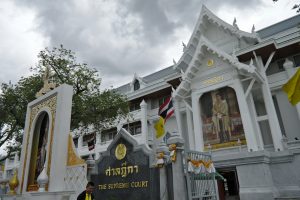Friday, October 25 represents the 20th anniversary of one of the darkest days in recent Thai history. Twenty years ago on that day, during the Muslim holy month of Ramadan, Thai security services violently dispersed a large peaceful protest in front of the Tak Bai police station in Narathiwat province, southern Thailand, shooting dead seven protesters with live ammunition.
But what followed immediately after was even more horrific: army soldiers loaded some 1,300 detained protesters into army trucks to be taken for interrogation at the Inkayuth military base in far-away Pattani, stacking them like human logs five or six persons high into the trucks. By the time they arrived at the army camp, 78 detained protesters had suffocated or been crushed to death. Because of a lack of medical treatment at the camp, many other detainees sustained injuries that led to amputations and other medical complications.
Today, 20 years later, Tak Bai not only represents the anniversary of a horrific, preventable massacre, but it also represents the complete impunity with which the Thai security forces operate, as no one has ever been held accountable for the killings. After 20 years, the deadline to hold them accountable under Thai law has now expired, allowing them to escape justice.
That is not because those responsible for the massacre at Tak Bai are unknown: a government-appointed fact-finding mission released a report on the killings on December 17, 2004, identifying three high-ranking army officers as carrying primary responsibility for the events: the then-commander of the Fourth Army Region, Gen. Pisarn Wattanawongkiri; his deputy, Maj. Gen. Sinchai Nutsatit; and the then-commander of the Fifth Infantry Division, Maj. Gen. Chalermchai Wiroonphet.
But in Thailand, two systems of justice exist, side by side. On the one hand, ordinary Thai citizens and activists experience a system often characterized by severe and arbitrary injustice, extreme overcrowding in detention centers, and indefinite detention without trial. On the other hand, for Thailand’s politically powerful and wealthy elite, it is all too easy to bypass accountability for their actions altogether and to be shielded from justice by the very security forces that are supposed to enforce the law.
Gen. Pisarn was, until recently, a lawmaker with the governing Pheu Thai party, and both he and other suspects have recently traveled abroad for “medical treatment” to avoid a last-ditch effort to hold them accountable for the Tak Bai killings. Last December, the Thai police testified in Parliament that they could no longer locate the Tak Bai case file.
In the years that followed the Tak Bai massacre, many of those working for accountability for the killings were themselves targeted, killed, and disappeared. On October 20, 2006, just before the second anniversary of the killings, unidentified gunmen shot dead Muhammad Dunai Tanyino, 40, a community leader in Tak Bai, after he sought to bring some of the Tak Bai survivors to a meeting with the Fourth Army commander. In October 2007, an unidentified gunman murdered Ma-usih Malong, the husband of Yaena Salaemae, one of the most prominent human rights defenders working for justice in the Tak Bai case.
Personally, I will be forever haunted by the accounts of the survivors I interviewed for Human Rights Watch two decades ago, describing their desperate plight to stay alive as their fellow detainees, stacked on top and below them, suffocated one after the other.
But for the ethnic Malay population of the Deep South of Thailand, the failure to hold anyone accountable for the Tak Bai massacre of 20 years ago adds to a long list of continuing grievances, discrimination, and excessive use of force in repressing their community, and will continue to fuel violence in Thailand’s Deep South. Without justice and accountability, there can be no long-term resolution to the often-ignored conflict and its drivers.
Today represents a victory of impunity over justice in Thailand.

































